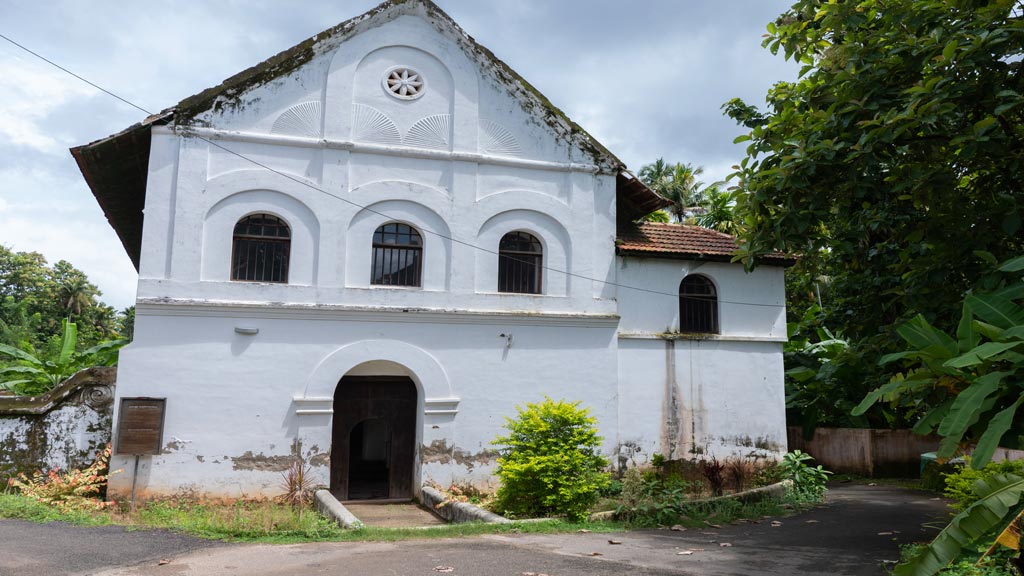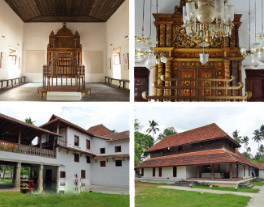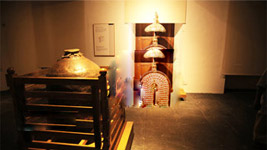The Chendamangalam Synagogue

The Jewish communities who reached the shores of Kerala at different periods of time and settled in and around the Kodungallur town were mainly involved in trade. Synagogues were their places of worship. Adopting numerous aspects of Kerala culture, the communities built the synagogues, after gaining special rights and privileges from the kings. Over the years, these synagogues were fated to endure repeated attacks by the Portuguese, the Dutch and the rulers of Mysore, all of which inflicted irrevocable damage on the structures. When Israel came into being, many of the Jews left Kerala in groups. The synagogues were left unattended and eventually the worship stopped.
The Jews who came from Kodungallur and Palayur to Chennoth (Chendamangalam) in 1420 built a synagogue for the Malabari [black] Jews. This synagogue built in the model of the Jerusalem Temple was destroyed in a fire, rebuilt in 1614, and renovated several times later. It is situated near the Kottayil Kovilakam hill, the headquarters of the Villarvattom Swaroopam, a local fiefdom in Cochin. It was the king of Villarvattom who offered land to the Jews to build the synagogue. As the Jews in Kerala returned to Israel during the 1960s, the worship at the synagogue came to a halt. In 1938, the Cochin wing of the Archaeological Department of Kerala renovated the structure and declared it a protected heritage site.
The Chendamangalam Synagogue, now maintained as a museum as part of the Muziris Heritage Project, showcases the lives and rituals of Kerala Jews who, even while remaining firm believers of their culture, lived in harmony with the local community. The front door opens to the Azara or the anteroom which leads to the vast prayer room. Behind it is the altar adorned with decorative works. A spiral staircase leads to a balcony and the prayer room which accommodates the second Bema (elevated platform for Torah reading). Two stone pillars with intricate carvings support it. The Ark made of teak, comprising beautifully carved images, is positioned on the wall across the door. The wooden planks on the roof have carved images of lotus that are painted.
Chendamangalam also bears significance as a centre of religious harmony and cultural coexistence, because a temple, a mosque, a church and a Jewish synagogue stand in close proximity to one another. Constructed during the 17th century on the land donated by the Paliam family, the Chendamangalam synagogue belonged to the black Jews and is arguably one of the oldest in Kerala. At the entrance is a fragment of a tombstone of a woman who died in 1264 AD. Other fragments of tomb engravings have also been found in the cemetery to the eastern side. This synagogue has been renovated and revived to its former glory by the Government of Kerala, and now houses a small museum that gives glimpses of early Jewish life in Kerala.
Architectural Features
(1).jpg)
The synagogue stands as a testament to India’s rich Jewish heritage, and points to an atmosphere of tolerance that prevailed here. The antechamber within the synagogue is called the Azara which leads to the ‘sanctuary’. The men assembled here to pray. The women gathered to pray in their own space upstairs, behind the wooden screen partition. In the centre of the sanctuary was the raised curved Tebah, where the Torah scrolls were unrolled and read. To the far end of the sanctuary was the Heichal, the focal feature of the room and where the Torah scrolls were kept. A beautiful set of colourful glass and metal lanterns originally hung from the lotus-patterned painted ceiling.
Though there are no Jews living here, the sanctity of the region is respected and kept intact. The most eloquent instance of it can be seen in the preservation of a Hebrew tombstone that stands in front of the Chendamangalam Jewish synagogue in Ernakulam district. The stone, carries an inscription dated 1269 CE, and the epigraph in Hebrew reads thus: ‘Here rests Sarah Bat Israel, who died and joined her creator on (day) (month) (year)’.
Exhibits
The Chendamangalam Synagogue museum showcases the Jewish customs in Kerala, the role of women in the Jewish community, Jewish songs, the peculiarities of their culture, etc.
.jpg)
 Nearest Railway station: Aluva, about 18 kms and Ernakulam, about 29 kms.
Nearest Railway station: Aluva, about 18 kms and Ernakulam, about 29 kms. Nearest Airport: Cochin International Airport, about 23 kms.
Nearest Airport: Cochin International Airport, about 23 kms.
